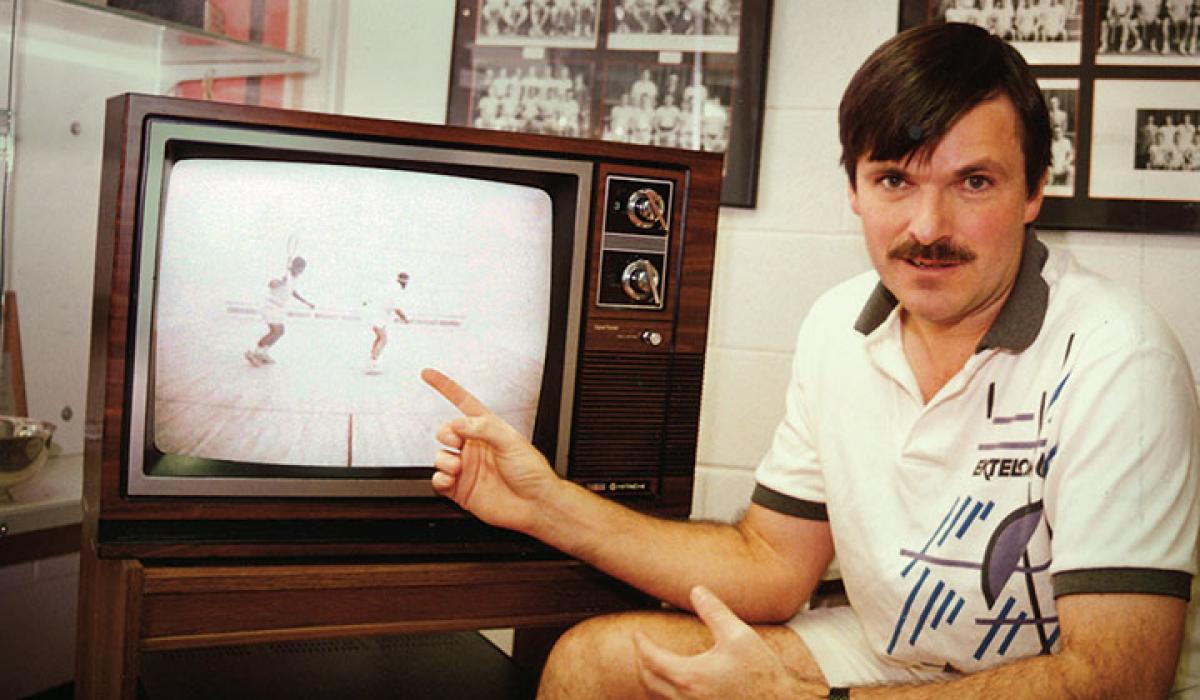July 5, 1955 – Jan. 27, 2015
Todd Harrity ’13, who would go on to win the men’s individual national squash championship as a junior, remembers a freshman-year team meeting before an early-season away game. The coach, Robert W. Callahan ’77, implored the players not to steal towels from the hotels they stayed in.
“He said that over the years, in every hotel he had been at, hundreds of towels had gone missing, and now in post offices, they had his picture up in six different states as a hotel-towel thief,” Harrity recalls. “I thought, what have I gotten myself into — and, oh my gosh, would that really go on a criminal record?”
Harrity soon realized that Callahan had a dry sense of humor and could use it to turn a mundane point about discipline into a memorable moment. Callahan, who died Jan. 27, 2015, led Princeton to 316 victories, 11 Ivy titles, and three national championships in 32 seasons. He set records, including one for longevity as the University’s longest-serving squash coach. He coached individual national champions, including Harrity, 10 times.
Callahan had played tennis from childhood but realized his passion was squash at Princeton, where he was an economics major and a member of Cottage Club. A two-time all-American, he was the captain in 1977, when the squash team had its second undefeated season in three years, and played on three national championship teams (in 1974, 1976, and 1977).
Callahan led Princeton to 316 victories, 11 Ivy titles, and three national championships in 32 seasons.
In 1980, Princeton asked him to serve on the search committee looking for a new squash coach. Callahan attended committee sessions and fretted. “After a little soul-searching and a few sleepless nights,” he wrote in his 25th-reunion yearbook, “I told them I knew just the right man for the job — me!” He took the job on what he said would be a sabbatical from his job at IBM, where he had worked since graduation. The team was undefeated in his first season. The sabbatical lasted another 31 years.
Callahan always seemed to think that time was limitless. “After practice in his office, if you stopped in, you’d be there a while,” Harrity says. “He would ask you questions: How are the classes going? He would remember if you had a test or you had a meeting with a professor. He’d ask you how that went.” He also talked before practice sessions. “Often the preamble to each practice [took] a long time, players itching to get on court,” James Zug wrote in Squash magazine. “At one point, his captains put a time limit on his pre-practice homilies.”
Time caught up with Callahan in the cruelest way. Soon after his team beat Trinity to win the national championship in 2012, he felt tingling in his arms. After some medical tests, he was presented with the diagnosis: glioblastoma, a malignant brain tumor. He resigned as coach the next year.
Surgery followed by radiation and chemotherapy slowed him down only so much. One day about a month after the surgery, he and his wife, Kristen, turned up in the office of Dave Talbott, Callahan’s opposite number at Yale. “My first words, which I remember clearly, were, ‘What are you doing here?’” Talbott wrote after Callahan’s death. “His response was, ‘What am I going to do, sit at home and miss looking for some players who can help my team?’”
James Barron ’77, a reporter and Metro columnist at The New York Times, was the secretary of his class for 28 years.


